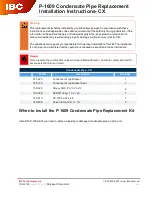
– Refill and commission the system as described in section 4.1.
8.12
D.H.W. HEAT EXCHANGER
– Remove the casing front panel as described in section 5.1.
– Isolate the C.H. flow and return valves, and the D.H.W. iso-
lation valve (19 - 18 - 20 fig. 2).
– Drain the appliance through the drain plug (13 fig 2).
– Drain the D.H.W. circuit by opening any D.H.W. tap below
the level of the boiler.
– Lift off the microswitch assembly.
– Remove the three screws fixing the D.H.W. heat exchang-
er and remove the heat exchanger.
– Fit new heat exchanger and re-assemble in reverse order
using the new gaskets supplied with the heat exchanger.
– Refill and re-commission the system as described in sec-
tion 4.1.
8.13
DIVERTOR VALVE - COMPLETE
– Remove the casing front panel as described in section 5.1.
– Isolate the C.H. flow and return valves, and the D.H.W. iso-
lation valve (19 - 18 - 20 fig. 2).
– Drain the appliance through the drain plug (13 fig 2)
– Drain the D.H.W. circuit by opening any D.H.W. tap below
the level of the boiler.
– Lift off the microswitch assembly.
– Remove the three screws fixing the D.H.W. heat exchang-
er and remove the heat exchanger.
– Pull out the divertor valve circlip and remove the valve.
– Transfer the electrical connections onto the new valve. If
necessary. refer to the wiring diagrams in section 7.
– Re-assemble in reverse order, using the new gaskets sup-
plied with the valve.
– Refill and re-commission the system as described in section 4.1.
8.14
DIVERTOR VALVE - MICROSWITCH ASSEMBLY
– Remove the casing front panel as described in section 5.1.
– Remove the two screws pivot the control box downwards.
– Lift off the microswitch assembly.
– Tr ansf er t he electr ical connections ont o t he new
microswitch assembly. If necessary refer to the wiring dia-
grams in section 7.
– Re-assemble in reverse order.
8.15
C.H. EXPANSION VESSEL
In the unlikely event of failure of the expansion vessel
diaphragm it is acceptable to leave the vessel in position
and to fit a replacement vessel (of similar or greater capac-
ity) external to the appliance but as close as possible to the
C.H. return.
Alternatively the vessel can be replaced as follows.
Note replacement is not recommended if a rear flue outlet
is used or if the clearance above the casing is less than
300 mm.
– Remove the casing front panel as described in section 5.1.
– Isolate the C.H. flow and return valves (17 - 18 fig. 2), and
drain the appliance through the drain plug (13 fig. 2).
– Unscrew the expansion vessel union on the C.H. return
pipe.
– If a rear flue outlet is used it is necessary to disengage
the flue and air duct temporarily. Refer to section 3.5.
– Remove the adjusting screws on the wall mounting brack-
et thereby allowing the appliance to move slightly for-
wards at the top.
– Lift the expansion vessel out of the appliance through
the top.
– Replace the expansion vessel and re-assemble in reverse
order. Re-pressurise and re-commission the system as
described in section 4.1.
8.16
THERMOHYDROMETER
– Remove the casing front panel as described in section 5.1.
– Isolate the C.H. flow and return valves (19 - 18 fig. 2).
– Drain the appliance through the drain point (13 fig. 2).
– Remove the circlip securing the pressure sensor to the
hydraulic group and pull out the sensor.
– Remove the fixing spring of the thermometer bulb from
the C.H. flow pipe.
– Squeeze the gauge to depress the retaining clips, then
ease the gauge forwards.
– Reassemble in reverse order.
Refill and re-commission the system as described in sec-
tion 4.1.
8.17
SAFETY VALVE
– Remove the casing front panel as described in section 5.1.
– Isolate the C.H. flow and return valves (19 - 18 fig. 2).
– Drain the appliance through the drain point (13 fig. 2)
– Remove the circlip securing the valve to the hydraulic
group and remove the valve.
– Fit the new safety valve and re-assemble in reverse order.
Refill and re-commission the system as described in sec-
tion 4.1.
8.18
AUTOMATIC AIR VENT
– Remove the casing front panel as described in section 5.1.
– Isolate the C.H. flow and return valves (19 - 18 fig. 2).
– Drain the appliance through the drain point (13 fig. 2).
– Remove the circlip securing the automatic air vent to the
hydraulic group.
– Fit the new automatic air vent and re-assemble in reverse
order. Refill and re-commission the system as described
in section 4.1.
8.19
TIME CLOCK
– Remove the casing front panel as described in section 5.1.
– Open the control panel protecting cover by removing the
four fixing screws.
– Pull off the electrical connections at the back of the clock.
– Remove the two screws securing the plastic frame of the
time clock to the facia panel.
– Remove the plastic frame and pull out the time clock.
– Re-assemble in reverse order and test the operation of
the new clock.
– Set it to the desired settings as described in section 4.3.
24
Summary of Contents for Murelle 25 BF
Page 24: ...Format C installation and servicing instructions...
Page 53: ...26...









































